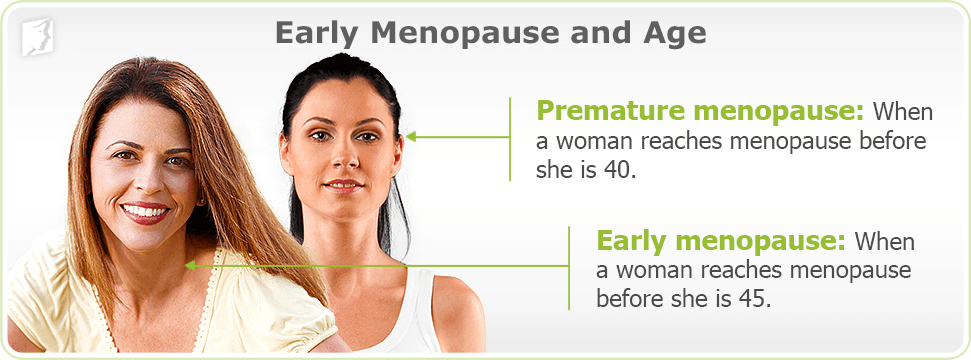Did you know?
Recent studies show that early menopause affects 1% of women worldwide. In USA, 4 of every 100 women deal with early menopause naturally.
Early menopause, commonly known also as premature menopause, indicates the ending of women's reproductive life at an unexpectedly young age. Normally, women enter menopause in their 50s. That's why, when women see that their bodies are already going through that last reproductive stage, many are shocked and faced with the reality of sudden infertility.
Learn more about early menopause, when it occurs, and tests that can help identify its onset.
What Is Early Menopause?
Early menopause is the unexpected onset of menopause at a young age. Despite most people's assumptions, early menopause is not a medical anomaly. In the U.S., 4 of every 100 women deal with early menopause.
Women who experience early menopause may have many aspects of consider. Some women who enter early menopause may be experiencing it before they have had the chance to start families of their own, which can be difficult to deal with. In the short term, they will also need to consider how they wish to treat their newly acquired symptoms. In the long term, women in early menopause will have to be aware of the increasing risk of osteoporosis and heart disease.
Fortunately, with the right information, women can manage their symptoms and improve their quality of life as they go through this transition. Learn more about when early menopause occurs and the tests that can determine whether or not you are going through this stage.
Early Menopause and Age
Average age of early or premature menopause
Normally, women reach menopause when they are in their 50s. However, this is not always the case. While the terms early menopause and premature menopause are used interchangeably, there is a distinctive difference between the two:

As can be seen above, the main difference among them is age. Something to take into account is that, while early or premature menopause can take women by surprise, it is not an uncommon occurrence.
Click on the link to learn more about the relationship of age and early menopause, or keep reading to learn about the different tests available for women to diagnose early menopause.
Tests for Early or Premature Menopause
If early menopause signs have been detected, there are certain tests that can determine whether or not you are experiencing early menopause. Test for early menopause are generally easy and involve no risk.
Common Tests for Early Menopause
Pregnancy test. Ruling out pregnancy is an important first step, since women going through the menopause process can still become pregnant.
Thyroid disease test. Some of the menopause symptoms are similar to those caused by thyroid disease. That's why, if they appear before 40, a thyroid disease test should be considered.
Thyroid disease test. Some of the menopause symptoms are similar to those caused by thyroid disease. That's why, if they appear before 40, a thyroid disease test should be considered.
Estradiol level test. Estradiol is a form of estrogen. If estradiol levels are low, it might indicate that there is some trouble with ovaries. Some conditions related to low estradiol levels are early menopause, ovarian failure, and Turner Syndrome.
FSH test. Follicle stimulating hormone (FSH) levels rise when there is a very low presence of estrogen in the body. Generally, when FSH levels are higher than estrogen levels, women are considered to be menopausal. However, since FSH levels vary during menstrual cycle, it is important to consider the help of a health practitioner when dealing with this test.
Premature or Early Menopause Risks and Side Effects
When women enter early menopause, they not only have to cope with menopause symptoms, they are at higher risk for many health issues, such as osteoporosis, heart disease, and stroke.
This is due to decreased estrogen levels, since estrogen regulates many functions in a woman's body. The most common risks and side effects of early menopause are listed below:
Common Risks and Side Effects
- Osteoporosis or diminished bone health
- Heart disease
- Stroke
- Infertility
- Miscarriage
Not only is it important to identify certain aspects of early or premature menopause, it is important to understand its underlying causes. Click on the following link to learn more about causes of early menopause.
Sources
- BMJ Group. "Menopause: What is it?" Patient Leaflet. 2007.
- Hopkins, Virginia. Lee, John R. M.D. What Your Doctor May Not Tell You About Menopause. New York: Warner Books Inc., 1996.
- Love, Susan M.D. Menopause and Hormone Book. New York: Three Rivers Press, 2003.
- Martin, Raquel. The Estrogen Alternative. Rochester, VT: Healing Arts Press, 2000.

